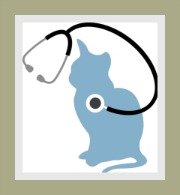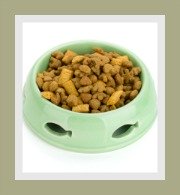Feline Infectious Peritonitis
Symptoms and Treatment
Many of the symptoms of Feline Infectious Peritonitis are not exclusive to this cat disease.
In the initial stages of infection there are often no apparent symptoms, but some cats may present with mild symptoms that include
- nasal discharge
- weeping eyes
- sneezing
- diarrhea.
Depending
on the cat's age, the strength of their immune system and the strain of
the virus, they may be able to fight the disease and recover from these
early signs and become carriers of the disease.
Cats that develop feline peritonitis will experience:
- a loss of appetite
- weight loss
- lethargy
- depression
- anemia
- fever and
- rough
hair coat.
As the disease progresses, the symptoms do become more severe.
Many cats are infected with the coronavirus, but only a small percentage of these infected cats actually develop FIP.
When the coronavirus mutates, it is then that the cat develops infectious peritonitis.
The disease can often strike weeks, months and sometimes years after the first contact with the virus.
Cat peritonitis may then develop into two lethal forms and depends on the strength of cat's immune system:
dry feline infectious peritonitis
This form of the disease develops gradually and the symptoms can be vague. Dry FIP is also referred to as Non-Effusive, Extra-Peritoneal or Atypical FIP.
common symptoms include:
general malaise (depression)
weight loss
chronic fever
anemia
symptoms can occasionally progress to:
Renal (kidney failure) associated with polyuria and polydipsia (increased thirst and increased frequency of urination)
Hepatic (liver failure) associated with jaundice, diarrhea and vomiting
Pancreas failure and the development of diabetes mellitus (sugar diabetes)
Central Nervous System involvement that would include a host of symptoms like:
- paresis (impaired or partial loss of movement)
- ataxia (gross lack of co-ordination)
- hyperesthesia (a heightened sensitivity of the senses to stimuli)
- convulsions (fits)
- behavioral changes
- eye disease, retinal detachment and blindness
Generally speaking, a gravely ill kitty!
wet feline infectious peritonitis
Wet FIP develops quite rapidly. It is also known as Effusive, Typical or Peritoneal FIP.
common cat peritonitis symptoms include:
- general malaise (depression)
- weight loss
- chronic fever
- anemia
symptoms can quickly progress to:
- accumulation of fluid in the abdomen (cat becomes pot-bellied)
- difficulty in breathing due to pressure on the lungs from the accumulation of fluid in the abdomen
diagnosing cat peritonitis
Feline peritonitis is generally very difficult to diagnose, partly because the symptoms imitate or are similar to many feline diseases.
There is no simple or specific diagnostic test to establish whether a cat has FIP.
The veterinarian will take a full history from the cat owner, perform a thorough physical examination of the cat and analyze the presenting symptoms.
Blood test. A blood test may identify the presence of coronavirus antibodies. This generally only confirms that the cat has had exposure to the coronavirus. It is unable to confirm the strain of the virus.
X-Rays and Ultrasound. This test will confirm the presence of fluid in the abdominal and chest cavity.
Fluid aspiration. A sample of fluid is drawn from the abdomen and chest and examined for an increase in plasma protein, hypergammaglobulinemia and hyperglobulinemia.
MRI and Spinal tap may be performed on cats that present with neurological symptoms.
None of the above tests will provide a definitive diagnosis.
Biopsy of body tissue would be the primary test to confirm diagnosis of feline infectious peritonitis.
Sadly, many cats are too sick to undergo all the various tests
and often, the disease is only confirmed after the death during
autopsy.
treatment of feline peritonitis
Unfortunately, there is no cure for this disease.
Cats that develop FIP usually die - the mortality rate is around 95 %.
A cat with wet FIP normally dies within a couple of months, whilst those with dry FIP survive up to a year.
In rare cases the cat may experience short-term remission. Your veterinarian will advise you on the best course of treatment for your sick cat.
As a cat owner you will need to consider the benefits of the treatment and the quality of life the treatment will provide.
The prognosis and of course the financial implications will also be considerations.
Treatment will be supportive and will generally be aimed at making the cat more comfortable:
- appetite stimulants
- drugs to reduce fever
- anti-inflammatory drugs
- intravenous fluid replacement
- administration of antibiotics and corticosteroids
- Cats with wet feline infectious peritonitis may require drainage of the fluid from the abdominal and chest cavities to relieve pressure and assist with breathing
We have read that researchers have had some success treating cat peritonitis using antiviral drugs, but at this stage it is experimental.
In many instances, the most appropriate course of action would be
euthanasia - this would avoid prolonged suffering for a beloved pet.
prevention of cat infectious peritonitis
FIP is uncommon in single-cat households or those cats living exclusively indoors.
Shelter cats, cats in breeding catteries, outdoor cats and cats in multi-cat households are at greater risk of contracting feline diseases like feline peritonitis.
The following preventative measures will assist in minimizing exposure to the FIPV:
Cat peritonitis vaccine. An intra-nasal vaccine is available in the United States and some European countries. This modified live vaccine is believed to provide protection to some, not all cats. The effectiveness of this vaccine is still under question and many veterinary associations do not recommend the vaccine.
Cat vaccines against the core and non-core infectious diseases are essential for cats in multi-cat environments.
Good sanitation:
- Litter boxes should be cleaned and disinfected regularly and feces cleared twice daily.
- Food and water bowls should be disinfected daily and should not be situated close to litter boxes.
- If possible cats should not share food and water bowls, bedding or litter boxes.
- Cat enclosures should be disinfected regularly (household bleach has proved most effective for this)
Shelters and catteries should avoid over-crowding.
Cats and kittens in shelters and catteries should be not be exposed to undue stress
Special attention to cat nutrition and a well balanced diet is essential to cat health
Cats or kittens suspected of having feline infectious peritonitis should be isolated from healthy cats.
Top of Feline Infectious Peritonitis
Return to Feline Peritonitis
search our site
please like us
share our site
recommend on google
favorite pages





